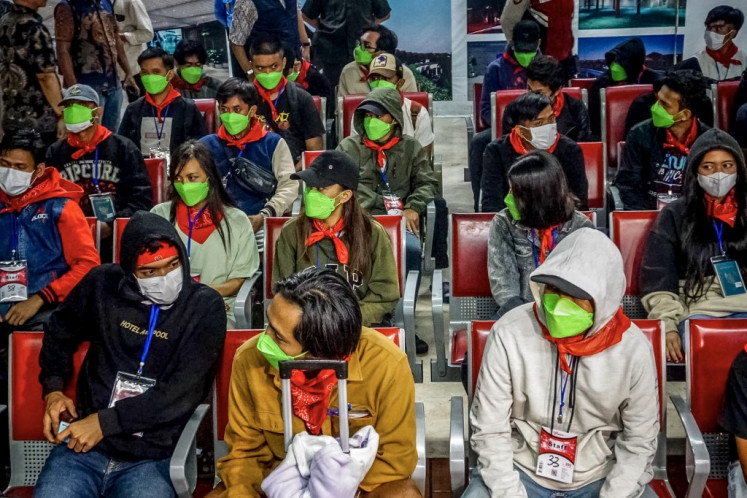Popular Reads
Top Results
Can't find what you're looking for?
View all search resultsPopular Reads
Top Results
Can't find what you're looking for?
View all search resultsEditorial: Shameful justices
The Supreme Court’s ruling last Friday, which technically sent a housewife, Prita Mulyasari, to jail over an active Internet campaign, was controversial in nature as it had defied the general public’s sense of justice and therefore revived the public’s outcry with the country’s judicial system
Change text size
Gift Premium Articles
to Anyone
T
he Supreme Court’s ruling last Friday, which technically sent a housewife, Prita Mulyasari, to jail over an active Internet campaign, was controversial in nature as it had defied the general public’s sense of justice and therefore revived the public’s outcry with the country’s judicial system. A lower court — the Tangerang District Court — had acquitted her of all charges in the criminal case.
So strong was the general public’s condemnation on the court’s ruling that a legal expert of high caliber like former Constitutional Court chief Jimly Asshiddiqie even categorized the prosecutors and judges on her case as “anti-justice”.
The Court sentenced Prita to a conditional six-month jail term for violating the 2008 Electronic Information and Transactions Law over her initiative in August 2008 to
send an email to relatives and friends, alleging she received poor medical treatment and customer service at the Omni Hospital in Tangerang, Banten. The ruling upheld an appeal filed by prosecutors to overturn her acquittal.
The Supreme Court’s ruling on the criminal case was also controversial in substance as it had been inconsistent with a previous ruling of the same court, which ruled last year in favor of Prita — substantially rejecting the Rp 2 billion (US$236,000) civil lawsuit filed by the hospital.
It is therefore logical if experts in the legal circle call on the party of interest — in this case Prita — to file a case review as the last resort available in Indonesia’s judicial system to challenge a Supreme Court ruling. Others suggested she challenge the substance of the 2008 Law at the Constitutional Court in an attempt to have the ruling on the criminal case annulled or even ask the House of Representatives to have the law revised. Judicial Commission chairman Eman Suparman went further, saying that the commission would study the ruling to determine if the panel of judges in the case had made any ethical violations.
All the criticisms and arguments against the court’s ruling were technically and reasonably correct as judges recognize principles of consistency, conscience and independency in each of their rulings. But it was the same principle of independency and conscience that had likely been the basis of their ruling on Prita.
It is apparent that the judges were confident that Prita was guilty according to the law. But they were at the same time aware that handing down a jail term against her would hurt the general public’s sense of justice and further trigger massive condemnation and pressure, as the public had demonstrated on the social media network at the initial hearing of the case which had led to her acquittal by the Tangerang Court.
And imposing a probational jail sentence, which would mean that Prita would need not serve the six-month jail term unless she committed a crime within a year of probation, is likely a legal-political compromise that the judges may think as a win-win solution — for the general public and Prita on one side and law enforcement on the other.










